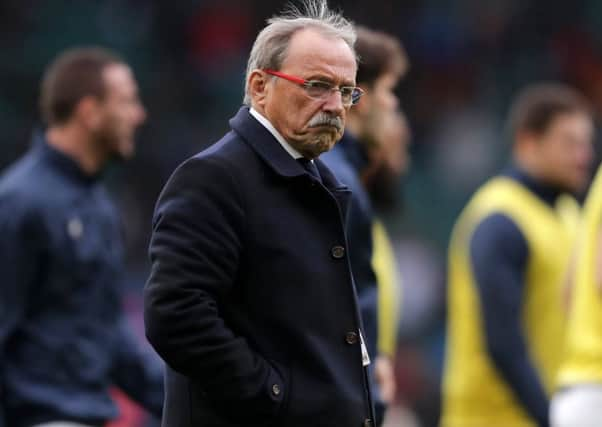Allan Massie: Scotland should be wary of French revolution


Stuart Hogg, Huw Jones, Willem Nel, Sam Skinner, Ryan Wilson and Hamish Watson are all posted missing, joining the long-time absentees: John Barclay, Duncan Taylor, Mark Bennett and Matt Scott. Other squad members, such as Lee Jones, are also currently hors de combat. On the credit side Sean Maitland, who missed the Italy game, returned against Ireland, as did Fraser Brown and Peter Horne to the bench. Richie Gray is on the point of returning to match fitness, while last night Edinburgh’s Magnus Bradbury will have played his first match for four months.
With Finn Russell and Greig Laidlaw both required by their French clubs this weekend, as Sean Maitland may be by Saracens, Gregor Townsend is likely to have his fingers so tightly crossed that they may get stuck together.
Advertisement
Hide AdAdvertisement
Hide AdOf course every team has some players absent injured. England, for example, will be without Maro Itoje and Mako Vunipola when they play Wales in Cardiff. But England have a depth of resources other countries, especially Scotland and Italy, lack. There are, after all, as many top-flight professional clubs in England as in Ireland, Wales, Scotland and Italy together.
Looking ahead to Paris we may think that, whatever problems Townsend has, the French coach, Jacques Brunel, has worse ones after France’s humiliation at Twickenham. There is even talk of a players’ revolt. We should be wary of that. The last time there was one, in the 2011 World Cup, France came within inches of beating New Zealand in the final.
Revolt or not, France have sunk to tenth place in the IRB rankings and have won only three of their last 18 internationals. Given the history of French rugby, this is as extraordinary as it is lamentable. In fairness – and as a warning to Scottish optimists – one should say first that they had the beating of Wales till two mistakes led to opportunist Welsh tries, and, second, that England were so good at Twickenham that one was pleased and relieved that they were playing France, not us. It was the most impressive English performance for years and they might have beaten any team in the world.
When a team has a run of poor results, any coach’s position is precarious. Actually Brunel has a problem that some Scottish coaches in the professional era will recognise, with perhaps a reminiscent shiver. Do you continue to shuffle the cards, selecting experienced players who, whatever their talent, have grown so accustomed to defeat that they have forgotten how to win, may even become unnerved if within sight of victory? Or do you turn to youth and chuck youngsters into the pool hoping they will swim?
So far Brunel has tried a bit of mix-and-match. He has brought in talented young players: Damian Peneau, Romain Ntamack, Antoine Dupont, Demba Bamba and Felix Lambey. All have had their moments, Peneau, the most experienced of them, in attack anyway, and especially the Toulouse scrum-half Antoine Dupont who has impressed every time I have seen him. Evidently mix-and-match was disastrous at Twickenham, but I wouldn’t be surprised if Brunel stuck with it against Scotland, though some of those in the mix will probably be changed.
One welcome feature of this year’s tournament has been a reduction, admittedly only a modest one, in the number of would-be attritional repeated phases of pick-and-go or one- pass rugby, and a willingness to kick intelligently in attack.
In the modern game you often have a better chance of scoring a try from deep than when camped in the opposition 22. Most of England’s tries against France were the result of putting a kick into space and following up hard. All four tries at Murrayfield last week were triggered around the half-way line. In contrast Scotland spent the last five minutes of the first half camped in the Irish 22 – and got nothing from being there. Certainly there are teams that regularly score when they have the throw at a line-out in the opposition 22, but often the longer you are camped there, the less likely the try becomes.
Keeping the scoreboard moving usually makes sense, almost always in a close match. So it’s often a mistake to spurn the chance of an easy three points from a penalty – or to forget about the drop-goal. How many matches did Jonny Wilkinson and Ronan O’Gara influence, or even decide, by opting for a drop?
Well, coaches have a week more in which to mull over any lessons to be learned from the first two rounds – and a week in which medical bulletins will be anxiously scrutinised.